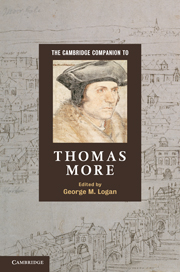Book contents
- Frontmatter
- Part I Life, times and work
- Part II Five Major Works
- 7 Reading Utopia
- 8 More on tyranny: The History of King Richard the Third
- 9 ‘The comen knowen multytude of crysten men’: A Dialogue Concerning Heresies and the defence of Christendom
- 10 ‘In stede of harme inestimable good’: A Dialogue of Comfort against Tribulation
- 11 The Lessons Of Gethsemane: De Tristitia Christi
- Part III Reception
- Foundational resources for More studies
- Index
7 - Reading Utopia
from Part II - Five Major Works
Published online by Cambridge University Press: 28 May 2011
- Frontmatter
- Part I Life, times and work
- Part II Five Major Works
- 7 Reading Utopia
- 8 More on tyranny: The History of King Richard the Third
- 9 ‘The comen knowen multytude of crysten men’: A Dialogue Concerning Heresies and the defence of Christendom
- 10 ‘In stede of harme inestimable good’: A Dialogue of Comfort against Tribulation
- 11 The Lessons Of Gethsemane: De Tristitia Christi
- Part III Reception
- Foundational resources for More studies
- Index
Summary
The modern reader of Utopia, challenged by the provocations of More’s traveller’s tale, may find a degree of reassurance in the apparent failure of some among More’s contemporaries to get the point. In 1518 the Alsatian humanist Beatus Rhenanus, who at that time was seeing the third edition of Utopia through Johann Froben’s press in Basel, wrote to the imperial councillor Willibald Pirckheimer, reporting how he had praised the book to a group of respected men. One of these had responded with the observation that ‘More deserved no more credit than a paid scribe, who simply writes down what other people say after the fashion of a pen-pusher … Everything in the book, he said, came from the mouth of Hythloday; all More did was write it down’ (CU 258–9). It is as well to be cautious here: maybe this dim individual, whose opinion was warmly supported by the others present, is just another literary invention. Certainly, his literal-mindedness seems to glance back at More’s own prefatory letter to Peter Giles which had been part of the book since the first edition, printed at Louvain some two years earlier. There More plays on the same theme: ‘I confess, my dear Peter, that having all these materials to hand left hardly anything at all for me to do.’ His job was just to write down what he heard (CU 31). The author, in other words, is simply a passive conduit for the adventures described by the enigmatic figure of Raphael Hythlodaeus.
It can be no great surprise to learn that Beatus’s group of wooden-minded literalists are theologians, representatives of that institutional scholasticism which forms a frequent target of Erasmus’s satire. One revealing illustration of such a mentality, no doubt spiced up by Erasmus, occurs in a letter he wrote to More in 1520, describing his clash with the Louvain theologian Nicolaas Baechem.
- Type
- Chapter
- Information
- The Cambridge Companion to Thomas More , pp. 139 - 167Publisher: Cambridge University PressPrint publication year: 2011
- 7
- Cited by



